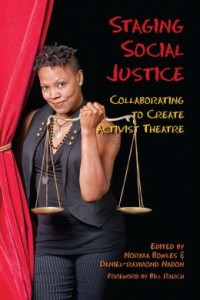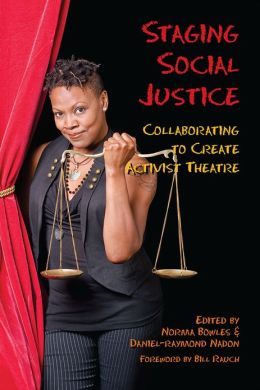 Staging Social Justice: Collaborating to Create Activist Theatre
Staging Social Justice: Collaborating to Create Activist Theatre
Edited by Norma Bowles and Daniel-Raymond Nadon
Southern Illinois University Press. 328 pages, $35.
IN 1991, Fringe Benefits Theater Company co-founder and artistic director Norma Bowles began collaborating with homeless queer youth in Los Angeles to devise original theater pieces depicting the sometimes brutally harrowing, often boldly inspiring actualities of their young lives. These powerful early pieces were performed at Highways Performance Space as well as at area high schools. They were acclaimed by critics and community alike, and Sir Ian McKellen himself narrated the film Surviving Friendly Fire about the company’s unconventional process. A subsequent project, Cootie Shots, resulted in a play tour and ensuing anthology that was groundbreaking in that it brought GLBT stories into elementary schools throughout the U.S. as early as 1999.
Since then, indefatigable-optimist-slash-results-oriented-pragmatist Bowles has worked tirelessly as a playwright, director, and activist in the fight to promote equality and end bullying in both urban and rural settings in the U.S. and abroad. Partnering with numerous organizations on three continents, Bowles’ brainchild Fringe Benefits has helped devise dozens of theater pieces that address institutional homophobia, heterosexism, transphobia, and other forms of discrimination. Using a democratic playwriting process during their five-day TSJIs (Theatre for Social Justice Institutes), Fringe Benefits leads intensive workshops that harness the stories of students, theater professionals, and community members from both “marginalized” and “in power” demographics. In a whirlwind of creative collaboration that Bowles cleverly describes as a “dramaturgical quilting bee,” these Institutes generate persuasive plays that are then used by the local partners and cosponsors as tools to initiate positive social change in their respective communities.
In the new anthology, Staging Social Justice: Collaborating to Create Activist Theatre, Bowles and co-editor Daniel-Raymond Nadon have curated a series of enticing essays written by TSJI facilitators and collaborators whose collective writings extract and share practical wisdom gleaned from participating in the mayhem of this sometimes painstaking yet always dynamic process. Emphasizing concepts such as “safe space,” “target audience,” “empowerment,” the “movable middle,” and “intergenerational collaboration,” the essays combine to make a convincing case for the efficacy of Bowles’ Theater for Social Justice as an accessible vehicle by which to implement social change on a grassroots level.
Providing both anecdotal evidence and hard data from their post-show surveys, the book argues that this work makes a difference in transforming individual gay and lesbian lives, as well as the communities in which they live. In this way, the anthology functions as both a practical manual and a theory of social change. Nineteen of its 27 essays describe performances that confronted discrimination against GLBT people. These plays tackled diverse topics ranging from marriage equality and accessible transgender bathrooms on college campuses to teen bullying, hate crimes, and homelessness. The remaining essays—which deal with other forms of oppression, including sexism, racism, and able-ism—were written by theater practitioners who self-identify as gay, lesbian, queer, transgender, or allied.
Divided into six sections each addressing one aspect of the process (for example, “devising text,” “community building,” and “measuring impact”), the essays are readable, instructive, honest, and often humorous. The well-organized sections are composed of four to six essays apiece. Each offers a unique viewpoint about the topic at hand. All contain compelling stories of the individual writers’ personal experiences with one of Fringe Benefits’ Theatre for Social Justice Institutes. As such, the anthology encompasses a broad array of perspectives and represents a variety of backgrounds with respect to age, gender, and professional field. By synthesizing the insights of activists, artists, educators, psychologists, students, and other community members, the editors have offered a comprehensive view of Fringe Benefits’ process, as well as vivid accounts of their admirable work of the past decade.
Darren Blaney, PhD, is a lecturer at the University of Miami.






